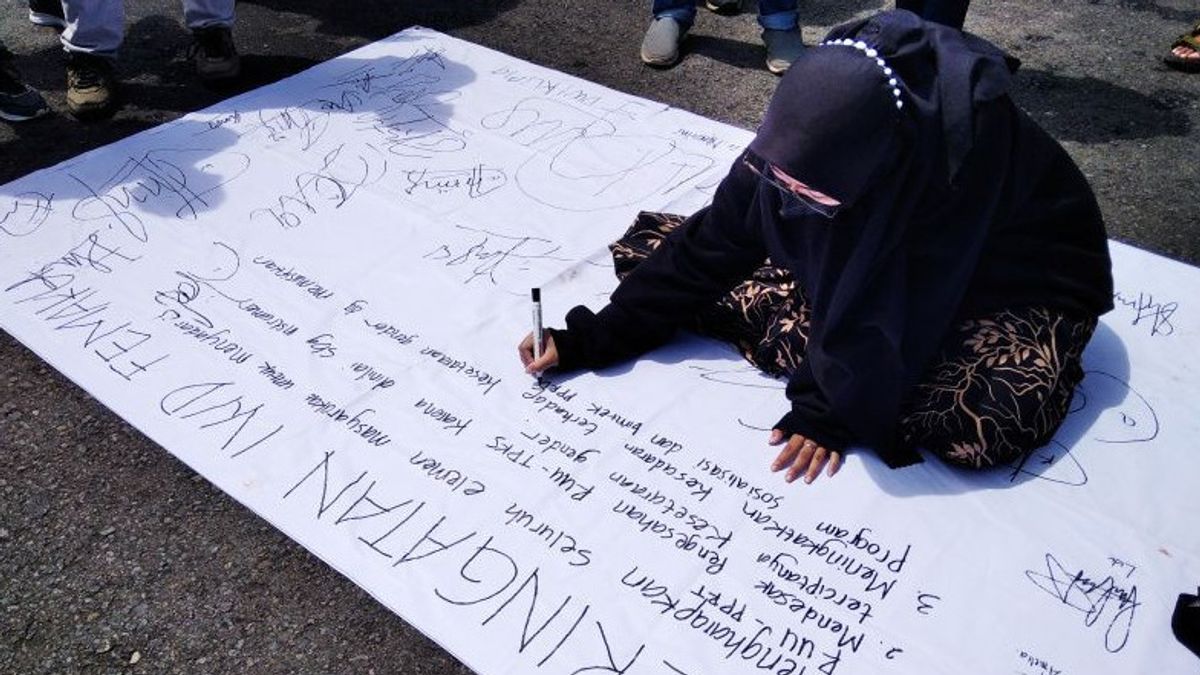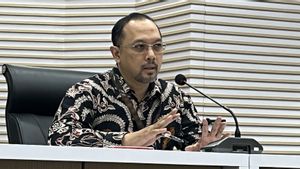JAKARTA – The crime of sexual violence in the country continues to increase, from time to time. This creates anxiety in the community. Even in the educational environment, sexual violence is becoming more and more common.
This picture occurs in a campus environment that should be covered by science and etiquette as a component to prevent the emergence of echoes of news about crimes that take a person's independence. It is undeniable, Mother Earth is again troubled by the frenzy of news about the occurrence of criminal acts of sexual violence in the higher education environment.
As contained in survey data from the Ministry of Education, Culture, Research, and Technology (Kemendikbudristek) in 2020 it was found that around 77 percent of lecturers admitted that sexual violence had occurred on campus. Of these cases, about 90 percent of the victims were women and 10 percent were men.
As many as 63 percent of cases of sexual violence on campus were never reported in order to maintain the good name of the educational institution.
According to Komnas Perempuan Commissioner Andy Yentriyani, the weak handling of cases of sexual violence on campus has pushed more and more similar cases. He said that the weak point in handling cases of sexual violence arises because the perpetrator is the closest person to the victim on campus, such as lecturers, students, or employees. Victims tend to be reluctant to report.
Andy conveyed that the lack of complaints of sexual violence on campus shows that not all scopes of educational institutions have clear, easy to implement, and effective rules. Both related to prevention and handling of sexual violence against victims, including their recovery.
A sad note also came from the Savy Amira Women's Crisis Centre. As quoted from the official website, from the findings of 34 cases of sexual violence in 2021, 19 of them occurred in the campus environment. In fact, Savy Amira noted that the 6 perpetrators of these crimes came from their own campus.
In general, in various fields, the Supreme Court Justice of the Republic of Indonesia Jupriyadi said that in response to the increasing number of cases of sexual violence from day to day, the Government and the Indonesian House of Representatives have issued a number of regulations to strengthen the role of law enforcement officers in handling these cases.
He said that starting from the inadequate view in the Criminal Code (KUHP) to ensnare perpetrators of sexual violence, Law (UU) Number 23 of 2002 concerning Child Protection was promulgated. This law was later amended by Law Number 35 of 2014. Subsequently, it was again amended by Government Regulation in Lieu of Law of the Republic of Indonesia Number 1 of 2016, and the last one was changed to Law Number 17 of 2016.
There is also Law Number 23 of 2004 concerning the Elimination of Domestic Violence (PKDRT) and Law Number 21 of 2007 concerning the Eradication of Trafficking in Persons (TPPO).
However, Jupriyadi said that law enforcement in cases of sexual violence has not been maximized. This condition is unsatisfactory to the public and has led to demands that the Government and the Indonesian House of Representatives immediately ratify the Draft Law (RUU) on the Crime of Sexual Violence (TPKS) into law.
The regulation is considered by a number of groups, ranging from academics, activists, and several parties from the government to be able to maximize law enforcement against cases of sexual violence.
According to the Assistant Deputy for Fulfillment of Women's Rights, Protection and Empowerment of the Coordinating Ministry for Human Development and Culture (Kemenko PMK) Roos Diana Iskandar, the problem of sexual violence is a scourge in human development in this country.
He even revealed that cases of sexual violence can happen to anyone, be it women, men, children, or adults.
In line with Jupriyadi, Roos Diana Iskandar views that the current national regulations are not sufficient to prevent and deal with cases of sexual violence that are increasingly happening.
Then what about the regulations regarding the prevention and prosecution of sexual violence cases on campus?
Specifically related to cases of sexual violence on campus, a glimmer of hope for better prevention and treatment emerged when the Ministry of Education and Culture issued the Regulation of the Minister of Education and Culture Number 30 of 2021 concerning the Prevention and Handling of Sexual Violence in Higher Education.
The regulation, which is more specific in dealing with the issue of sexual violence in the campus environment, has received a positive response from many groups. This rule is considered capable of expanding the definition of sexual violence. Even the Deputy Coordinator of the Volunteer Advocate Foundation for the Indonesian Women's Congress (YLBH and MK Kowani) Foundation for Legal Aid and Family Affairs, Indriati assessed that Permendikbudristek Number 30 of 2021 was aimed at recovering victims of sexual violence.
According to Mendikbudristek Nadiem Makarim, the TPKS Law will later become a legal reference for Permendikbudristek Number 30 of 2021. In other words, Nadiem assesses that prevention and handling of sexual violence cases requires a strong legal basis and one of them can be fulfilled through the ratification of the TPKS Bill.
The TPKS Bill has an important role to be ratified immediately in order to strengthen the prevention and handling of sexual violence in Indonesia, both on campus and in other areas.
The Urgency of the TPKS Bill
Roos Diana explained the reasons for the TPKS Bill to be ratified immediately. First, the urgency of the ratification of the TPKS Bill cannot be separated from the fact that the legal instruments in Indonesia, namely the regulations in the Criminal Code are still limited in regulating the prosecution of cases of sexual violence.
Roos Diana said that the Criminal Code only contains procedures for law enforcement officers to take action on two types of sexual violence cases, namely rape and sexual harassment or obscenity.
Meanwhile in the TPKS Bill, there is a more detailed classification of types of sexual violence, which includes several categories with a broader definition and is believed to be more capable of ensnaring perpetrators. This category consists of sexual harassment, forced use of contraceptives, forced sexual intercourse, sexual exploitation, and criminal acts of sexual violence accompanied by other criminal acts.
Second, he said that the TPKS Bill was able to provide better protection for victims of sexual violence, victims' families, and witnesses. In fact, Roos Diana said that the TPKS Bill stipulates that perpetrators of sexual violence will receive rehabilitation so that they do not repeat any of the acts that are classified as extraordinary crimes.
Not stopping there, Deputy Minister of Law and Human Rights (Wamenkumham) Edward Omar Sharif Hiariej added to the long list of explanations emphasizing that the TPKS Bill is important to be ratified immediately in order to eradicate the crime of sexual violence.
According to Eddy, Edward Omar Sharif Hiariej's nickname, there are four important points in the TPKS Bill which are effective in eradicating the crime of sexual violence in any environment.
First, law enforcement officers are not allowed to reject reports relating to cases of sexual violence. Thus, they are required to process all cases related to sexual violence.
Second, Eddy said that the settlement of criminal cases of sexual violence would not be able to use a restorative justice approach. Third, law enforcement officers will be facilitated in processing cases of alleged sexual violence because one witness and other evidence have been declared sufficient to process cases of sexual violence.
Then for rape victims who generally do not have other witnesses, the results of the post-mortem can be used as evidence. Finally, the TPKS Bill requires that restitution be charged to perpetrators of sexual violence at an amount decided by the panel of judges handling the case.
From all the explanations and explanations, it is clear that the TPKS Bill plays an important role in preventing and taking action against cases of sexual violence, both on campus and in other areas of human life. Therefore, high hopes are hung on the DPR RI and the Government to immediately promulgate the TPKS Bill.
The English, Chinese, Japanese, Arabic, and French versions are automatically generated by the AI. So there may still be inaccuracies in translating, please always see Indonesian as our main language. (system supported by DigitalSiber.id)













